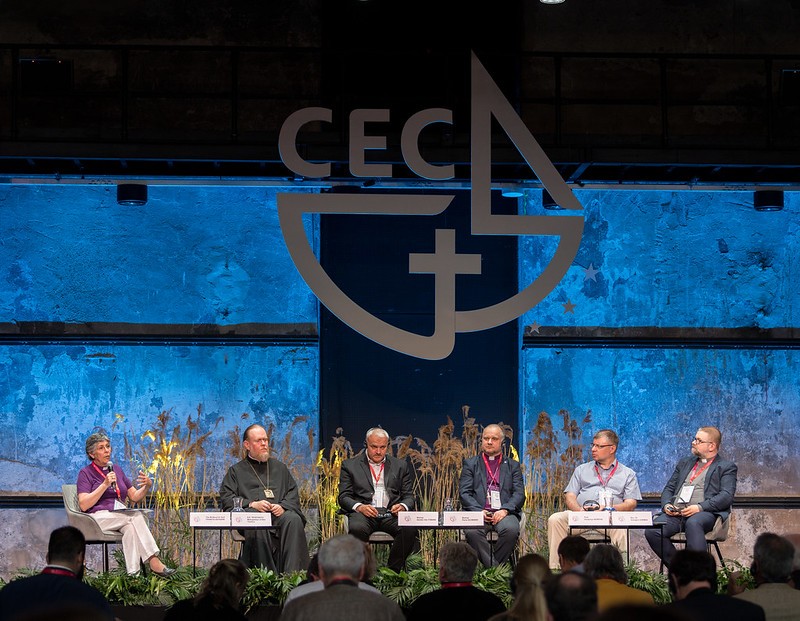
Photo: Albin Hillert/CEC
Press Release No: 19/23
18 June 2023
Tallinn
In a hearing session, church leaders from Ukraine highlighted the situation of their churches in a country at war, how they are witnessing to the gospel and how finding the right words in the face of unspeakable violence is a great challenge. The session was held on 17 June at the CEC General Assembly currently underway in Tallinn with the theme “Under God’s blessing - shaping the future”.
Where is God, when children are killed, when people are tortured, when an entire generation is traumatised? More than once, such questions emerged and it was clear that there are no easy answers.
At the beginning of their presentations, some panellists spoke about their experiences of the war. “Every day people are killed, children die, houses are destroyed. Every day someone buries a loved one. Every day someone is left homeless,” said Professor Volodymyr Bureha, Vice-Rector of the Orthodox Theological Academy in Kyiv, Ukrainian Orthodox Church. “And therefore, every day the first question confronting us as Christians is: Where is God in this war? Where was God when dozens of women, children, elderly people died under the rubble of a multi-storey building in Dnipro?”
Finding answers as church
Ukraine, like many countries under former Soviet rule, is largely secularised. “If we call Ukraine Orthodox or Christian, that is wishful thinking,” said Bishop Pavlo Schwartz of the German Evangelical Lutheran Church of Ukraine (GELCU). His church counts 4,000 members, most of them in the east of the country. “It will be the biggest challenge to talk to a traumatised secular person about forgiveness. This goes beyond our confessional narrative.”
While there was consensus that it was important to think about a post-war Ukraine, the right moment to act as peacemakers was a topic of debate. Many panellists agreed that the war challenged the Christian concept of loving the enemy and turning the other cheek, and that peace and reconciliation are only possible if accompanied by justice.
“A just peace involves eliminating the cause of war, not just its most visible effects. Peace cannot be established at the price of giving up the truth. Peace cannot be achieved by equating the attacker and the victim of the attack,” emphasised Metropolitan Yevstratiy of Bila Tserkva, Deputy Head of the Department for External Church Relations of the Orthodox Church of Ukraine. He also lamented many church leaders had “become minions of aggression, or hide behind a veil of silence.”
At the same time, church leaders voiced their worry about the narrative of hatred and revenge which the war has unleashed. “Churches must give an answer to the question of how to remain a Christian in this hell,” Bureha said.
Signs of hope
Bishop Sándor Zán Fábián of the Reformed Church in Transcarpathia talked about the impact of the war on his community in the west of Ukraine, which has welcomed internally displaced persons – both Russian and Ukrainian speaking – in more than 100 congregations and is sharing in their daily and spiritual lives. “In the shadow of this war, we actually experienced a gift of reconciliation among communities, which are usually being played against one another by politics,” he said.
At the same time, he warned that the mental and spiritual resilience of people is exhausted. “I see with worry and fear how the international community is putting on uniforms, and how the resolution of the conflict is discussed in a language of war and weapons.” He remarked that at the moment, nobody was trying to end the war, but that this would have to be the condition to discuss reconciliation and recovery. Schwartz, based in Kharkiv, argued that “we cannot stop defending ourselves – freedom for us is the biggest value.”
Rev. Dr Grzegorz Giemza, from the Ecumenical Council of Churches in Poland, introduced the project “Reconciliation between churches in Europe,” which has its origins in the Polish-German reconciliation process following World War Two and from 1997, also included Ukraine and Belarus. “Right now, it is impossible to talk about reconciliation in this group,” he said, “but we need to prepare for the time after the war, and we stay in contact.” In the past 25 years, the forum has created a space of trust which they can now fall back on. In-person meetings are conducted in Poland, currently the only place where everyone can travel safely. To prepare the ground for future generations, the group is planning a conference with students of the four countries.
“We need to uphold the relationships that we have,” Giemza said. “After the war, we will need all channels that bring people to one table. Churches are very good at facilitating that.” He voiced his conviction that reconciliation was possible.
Discover more:
- Church Response to Ukraine
- Pathways to Peace Initiative
- Photos from the hearing at the 2023 CEC General Assembly photo stream
For more information or an interview, please contact:
Naveen Qayyum
Communication Officer
Conference of European Churches
Rue Joseph II, 174 B-1000 Brussels
Tel. +32 486 75 82 36
E-mail: naveen@cec-kek.be
Website: www.ceceurope.org
Facebook: www.facebook.com/ceceurope
Twitter: @ceceurope
YouTube: Conference of European Churches
Subscribe to CEC news